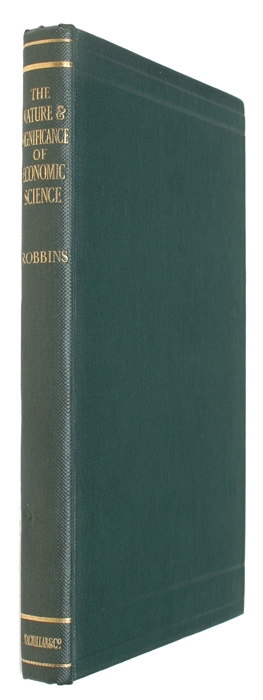DEFINING 20TH CENTURY ECONOMICS
ROBBINS, LIONEL.
An Essay on the Nature & Significance of Economic Science.
London, Macmillan & Co., 1932. 8vo. In the original green embossed cloth with gilt lettering to spine. Printed on thick paper. A few scratches to back board. Otherwise an very fine copy. XII, 141, (3) pp.
First edition of Robbins's landmark publication, in which he sought to define more precisely economics as a science. With the present publication he became instrumental in shifting Anglo-Saxon economics from its Marshallian direction which eventually caused the breakthrough of neo-classical (Walrasian) definition of economics. The work is "one of the most cited, if not most read, books on the subject in the period 1932-60, and it influenced greatly economists' views about the nature of their discipline." (The New Palgrave). The definitions of economics presented here "were widely accepted by the world of academic economists and are still propagated" (The New Palgrave).
Robbins put forth two central themes, both having a lasting and deep influence upon economics of the 20th century, the first being: "That economic science could be clearly demarcated from those discussions of economic issues that involved value judgments - by which latter term Robbins meant evaluation statements of the form 'better or worse' where inter-personal comparisons of utility were involved. He also argued that there was a clear demarcation between economic science and other branches of social enquiry such as social psychology, sociology, politics and so on."
The second major theme was that the subject matter of economic science was not a particular activity (for example, Cannan's view that economics was the science of wealth), but rather an aspect of all human conduct. This aspect was the 'fact' of economic scarcity - a manifestation of unlimited ends on the part of individuals and society and means of satisfying those ends that were limited in supply. In word so often quoted in economics text Robbins defined economic science as 'that science that studies the relationship between ends and means that have alternative uses' - a definition that is more than reminiscent of Menger's exposition of the economizing process." (The New palgrave)
Lionel Robbins (1898 - 1984) was a British (mainly theoretical) economist and head of the economics department at the London School of Economics. In macroeconomics Robbins's was a firm exponent of the Hayek's - and the Austrian school in general - teachings whom he brought to the London School of Economics in 1928. His liberal view was expressed when he famously, together with Joseph Schumpeter, advocated that nothing should be done about the 1929-depression and that it had to run its course since this alone would create a lasting development out of the depression.
Order-nr.: 48723

